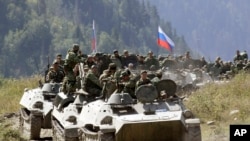It’s been 9 years since Russia recognized the Georgian territories of Abkhazia and South Ossetia as independent states, after Russia waged a brief but deadly war with Georgia in 2008. Hundreds died and more than 190,000 people were displaced in the 5-day conflict as Russian troops advanced into Georgia.
Only a handful of countries recognize the so-called independence of the two Georgian territories, which, in fact, remain firmly under Russian economic and military control -- even to the point of Moscow’s integrating members of its armed forces with those of South Ossetia. The United States and Georgia consider both Abkhazia and South Ossetia to be occupied Georgian territories.
The Georgian government accuses Russia of keeping Georgian farmers from their fields, isolating the people in the territories, and further violating Georgia’s territorial integrity by surreptitiously advancing the administrative boundary line even deeper into Georgia.
On the ninth anniversary of the Russo-Georgian war, August 8, Russian President Vladimir Putin visited Abkhazia. While there, he claimed that Russia “responsibly guarantees the security and independence of Abkhazia” and expressed confidence “that this will be so in the future as well.”
NATO’s acting spokesperson Dylan White condemned Putin’s visit, calling it “detrimental to international efforts to find a peaceful and negotiated settlement,” and emphasizing NATO’s support for Georgia’s sovereignty and territorial integrity. The Delegation of the European Union to Georgia published a similar denunciation.
State Department Spokesperson Heather Nauert called the visit by Putin to the occupied Georgian territory “inappropriate and inconsistent with the principles underlying the Geneva International Discussions, to which Russia is a party.” She also expressed full support for “Georgia’s sovereignty and territorial integrity within its internationally recognized borders.”
The United States, Ms. Nauert said, “urges Russia to withdraw its forces to pre-war positions per the 2008 ceasefire agreement and reverse its recognition of the Georgian regions of Abkhazia and South Ossetia.”
In the meantime, as Vice President Mike Pence made clear in his recent visit to Tbilisi, the United States “will continue to look for ways that we can strengthen Georgia not only from the standpoint of its defense and security, but where we can strengthen Georgia economically, creating jobs and opportunity and prosperity, and strengthening the hand of Georgia so that one day, Georgia can once again celebrate its historic territorial integrity intact.”














